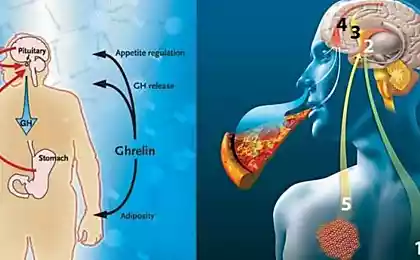709
Leptin and ghrelin - appetite control

What's a "gremlin"? - Asked the curious readers. And we'll tell you in detail and discover little secrets about the hormones of hunger and satiety.
Many are accustomed to assert that the fattening of hormonal disorders. I always looked at those people with irony, saying that there should be less - that's all! It turns out, is not so simple ...
The human body is a complex hormonal balance system. Hormones play an important role in controlling our weight.
In humans, there are really hormones responsible for hunger and satiety. But hormones - not the source of weight gain: the level of these hormones varies by amount of sleep, stress and other factors
. Therefore, it would be true to the statement: "I gained weight because often experience stress, remained alone or nevysypalas»
. In view of their impact on energy metabolism and appetite, scientists have even attempted to produce a vaccine against obesity.
We are programmed to maintain a normal weight for survival, but in the human body there is no mechanism which would prevent us from obesity. Imbalance of ghrelin and leptin causes obesity.
Leptin - a hormone of satiety
Leptin - a hormone (opened in 1994), which regulates energy metabolism. Leptin - a hormone of satiety, it sends a signal to your brain that it's time to stop eating
. Experts believe that when we do not sleep enough hours in the day, our body produces less leptin (and we feel that we do not saturate the usual amount of food) and enhances the production of ghrelin (and we begin to feel constantly hungry). The more tired from lack of sleep, the more and more we want to eat!
Ghrelin - a hormone starvation
Ghrelin was discovered in 1999 as the first circulating hormone hunger. Ghrelin acts contrary to signal the brain that we are very hungry.
ghrelin levels in blood plasma of obese people is lower than a lean people. People suffering from anorexia nervosa - eating disorders, - high levels of ghrelin in the blood plasma, and, compared with a very thin people and people with a normal physique. This proves that ghrelin plays an important role in anorexia nervosa, and obesity.
Today, the need for obtaining food has disappeared, but the amount of ghrelin produced remained the same. That is why every time refraining from eating in order to get into an evening dress or a bikini, we feel a keen sense of hunger that are ready alone swallow a cake, a box of chocolates or a mountain of pancakes.
But on the other hand, ghrelin has an important protective function, helping to resist life-threatening weight loss.
It is no coincidence that the highest levels of the active substance was observed in those who suffer from anorexia or sitting on a low calorie diet.
Lack of energy and weakness - the first thing that we feel at the lack of sleep.
Scientists, doctors and nutritionists believe that lack of sleep affects the metabolism (the body's metabolism).
For example, in the course of the experiment revealed that only a few days of sleep deprivation (for 4 hours instead of 7.8) - and the process of generation of glucose in the body becomes the same as that in the early stages of diabetes
. It is also enough to tip the balance two very important hormones - leptin and ghrelin
. If only two nights to sleep for 2-3 hours shorter than normal, our bodies begin to produce 15% more ghrelin, and 15% less leptin.
That is, the brain receives a signal that we lack 900 kilocalories a day - as much we lose if we sit on a low calorie diet
. By the way, in comparison with, for example, the 1960s all the people were sleeping on average less than 2 hours. And 60% of modern women feel tired. And about a third of them can not remember the last time they slept long, hard and as much as they wanted. Of course, this is not only a consequence of our way of life, but also changes in the nature and our perception of reality.
Apparently, ghrelin was really necessary in ancient times: the fear of famine reigned, and the hormone makes people eat when given the opportunity, thus giving a chance to survive in harsh times
. Fortunately, ghrelin is very easy to outwit. This requires a special approach to eating.
In order not to turn into a militant glutton, you just have to constantly be moderately well-fed. The best way to regulate appetite - have gradually every 3 hours, or 6 times a day, experts say
. Tasia Kearse























